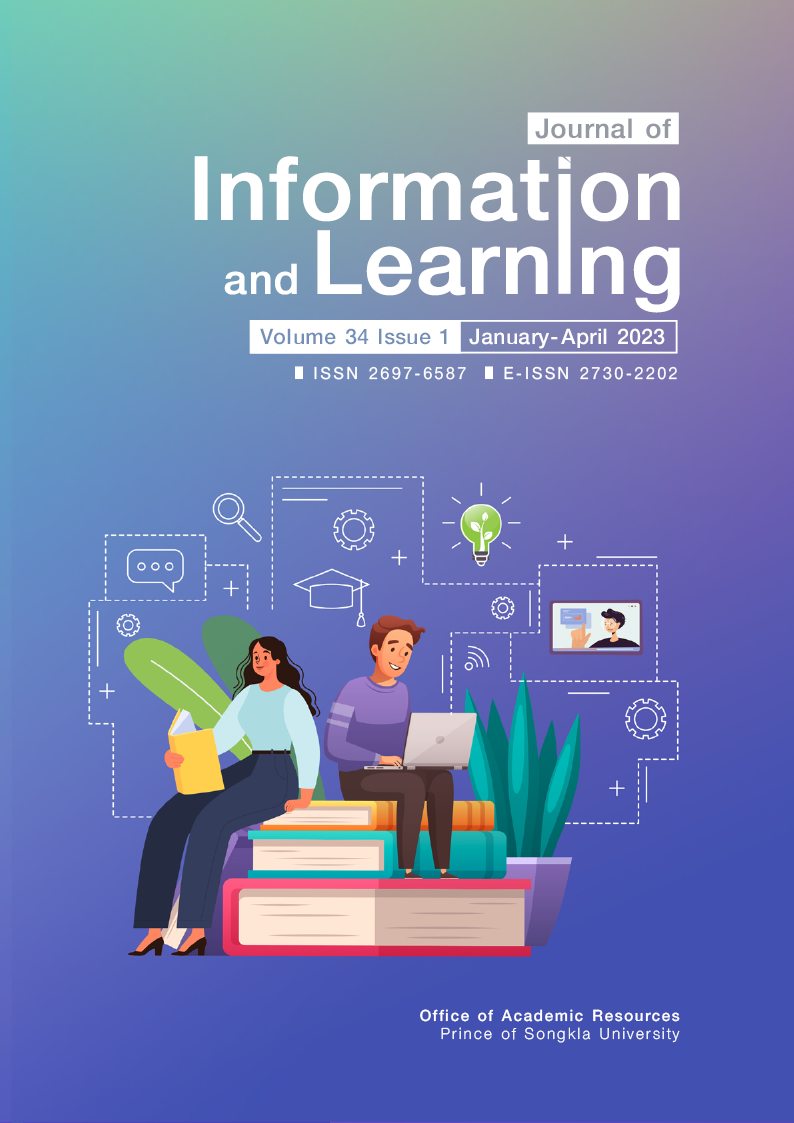The Development of Cloud Computing System and Factors Influencing the Behavior Intention to Using Cloud Computing System for Qualification of Teacher Professional Production at Bansomdejchaopraya Rajabhat University
Main Article Content
Abstract
The purposes of this research were to develop information system for cloud computing and to study factors influencing the use of the system to certify curriculum standards evaluation and professional teacher production at the Faculty of Education Bansomdejchaopraya Rajabhat University. This study proposes a unified model integrating the technology acceptance model (TAM) and external factor. In this quantitative research, data were collected using a questionnaire. The sample consisted of 102 students of Bachelor of Education at Bansomdejchaopraya Rajabhat University. The statistics were frequency, percentage, mean and standard deviation. Structural equation modeling was conducted to test the research hypotheses. The results showed that perceived usefulness factor was dependent on the direct influence of the performance expectancy factor, that perceived ease of use factor depended on the direct influence of the effort expectancy factor and social influence factor, and that the behavior of using the developed system was dependent on the direct influence of the perceived ease of use factor and the indirect influence of effort expectancy factor and social influence factor.
Article Details

This work is licensed under a Creative Commons Attribution-NonCommercial-NoDerivatives 4.0 International License.
The Journal of Information and Learning is operated by the Office of Academic Resources, Prince of Songkla University. All articles published in the journal are protected by Thailand copyright law. This copyright covers the exclusive rights to share, reproduce and distribute the article, including in electronic forms, reprints, translations, photographic reproductions, or similar. Authors own copyrights in the works they have created as well as the Office of Academic Resources. The Journal reserves the right to edit the language of papers accepted for publication for clarity and correctness, as well as to make formal changes to ensure compliance with the journal's guidelines. All authors must take public responsibility for the content of their paper.
References
Alsmadi, D., & Prybutok, V. (2018). Sharing and storage behavior via cloud computing: Security and privacy in research and practice. Computers in Human Behavior, 85, 218-226. https://doi.org/10.1016/j.chb.2018.04.003
Chavoshi, A., & Hamidi, H. (2019). Social, individual, technological and pedagogical factors influencing mobile learning acceptance in higher education: A case from Iran. Telematics and Informatics, 38, 133-165. https://doi.org/10.1016/j.tele.2018.09.007
Davis, F. D. (1989). Perceived usefulness, perceived ease of use, and user acceptance of information technology. MIS Quarterly, 13(3), 319-340. https://doi.org/10.2307/249008
Fornell, C., & Larcker, D. F. (1981). Evaluating structural equation models with unobservable variable and measurement error. Journal of Marketing Research, 18(1), 39-50. https://doi.org/10.2307/3151312
Kanjanawasee, S. (2001). Thritsadī kānpramœ̄n [Evaluation Theory]. Chulalongkorn University Press.
Ploysuayngam, W., & Tangwannawit, S. (2020, March 27). The development of web application to manage for information on professional internship in teaching [Conference session]. North Bangkok University National Conference Academic Year 2020 "Development of Human Resources to Economics and Digital Society", Bangkok, Thailand. http://www.northbkk.ac.th/conference/wp-content/uploads/2020/04/Oral-IsT.pdf
Rodrigues, J., Ruivo, P., & Oliveira, T. (2014). Software as a service value and firm performance - a literature review synthesis in small and medium enterprises. Procedia Technology, 16, 206-211. https://doi.org/10.1016/j.protcy.2014.10.085
Sánchez-Prieto, J. C., Olmos-Migueláñez, S., & García-Peñalvo F. J. (2017). MLearning and pre-service teachers: An assessment of the behavioral intention using an expanded TAM model. Computers in Human Behavior, 72, 644-654. https://doi.org/10.1016/j.chb.2016.09.061
Song, C., Kim, S. W., & Sohn, Y. (2020). Acceptance of public cloud storage services in South Korea: A multi-group analysis. International Journal of Information Management, 51, 1-12. https://doi.org/10.1016/j.ijinfomgt.2019.11.003
Stantchev, V., Colomo-Palacios, R., Soto-Acosta, P., & Misra, S. (2014). Learning management systems and cloud file hosting services: A study on students’ acceptance. Computers in Human Behavior, 31, 612-619. http://dx.doi.org/10.1016/j.chb.2013.07.002
Vu, K., Hartley, K., & Kankanhalli, A. (2020). Predictors of cloud computing adoption: A cross-country study. Telematics and informatics, 52, 101426. https://doi.org/10.1016/j.tele.2020.101426
Wu, B., & Chen, X. (2017). Continuance intention to use MOOCs: Integrating the technology acceptance model (TAM) and task technology fit (TTF) model. Computers in Human Behavior, 67, 221-232. http://dx.doi.org/10.1016/j.chb.2016.10.028


